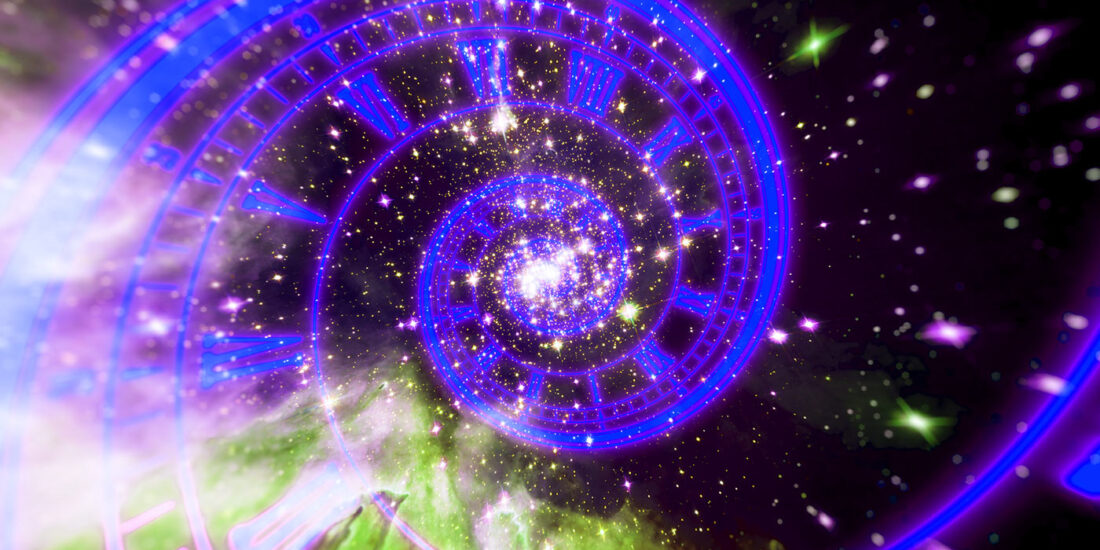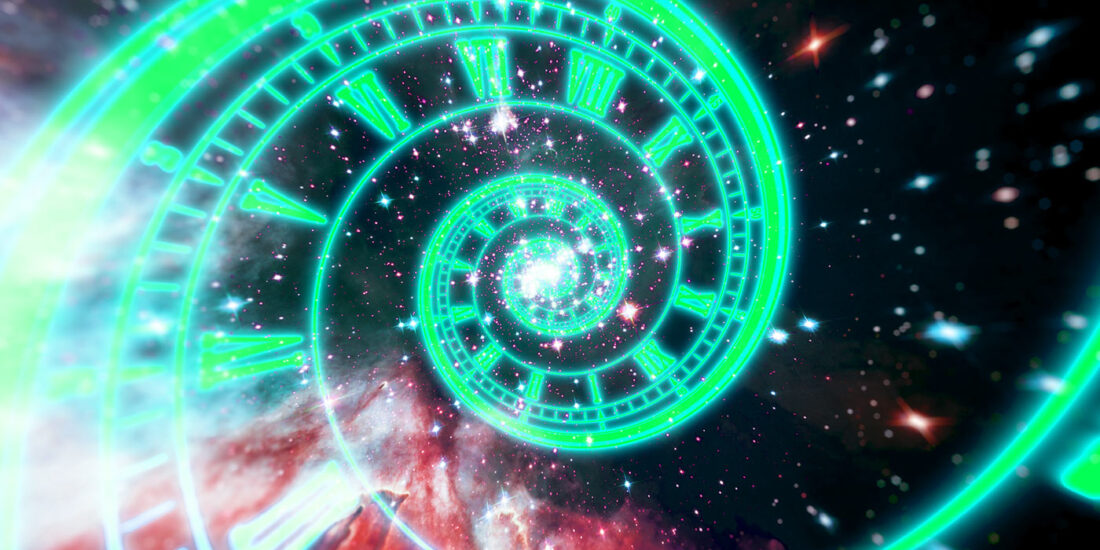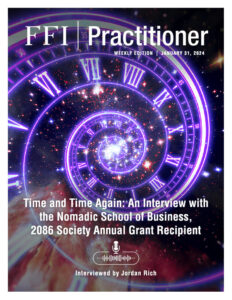
View this edition in our enhanced digital edition format with supporting visual insight and information.
We conclude our January series on Time with a podcast conversation with Anthony Willoughby, founder of the Nomadic School of Business, and Doutzen Groothof, a Dutch sociologist and coach who lives in Rwanda. She is the founder of StandTall, a boutique coaching and consulting enterprise. We hope this podcast is, well, timely, and will inspire you to think a bit more about “timelessness” as it applies to family enterprise consulting and research.
The Nomadic School of Business is the 2024 recipient of the 2086 Society’s annual grant, which will feature inspiring participants who have, and continue to have, nomadic characteristics and values, encompassing and embracing new environments and cultures, challenging themselves to continuously learn and grow.
Go here to access all the January FFI Practitioner articles.
Podcast Transcript
Jordan Rich: Welcome to today’s FFI Practitioner podcast, in which we feature this year’s recipient of the FFI 2086 Society annual grant: the Nomadic School of Business. Here to talk with us today, Anthony Willoughby and Doutzen Groothof will be working with FFI to plan and organize an exciting year, putting a new lens on the wisdom and inspiration from nomadic and indigenous tribes that are masters in adaptation and in building strong communities. In this podcast, you’ll hear us mention a series of webinars that will feature outstanding presenters connected to the Nomadic School of Business. More details and specifics will be forthcoming. Anthony, if you could, what’s the history of the Nomadic School of Business?
Anthony Willoughby: It actually evolved on a camel safari in Northern Kenya back in 1981. I’d gone for a 21-day camel safari, and each evening the Maasai, the tribal people, would walk into our little community. There were only five of us. And what I saw for the first time was absolute dignity and absolute substance without an iota of arrogance. So I became sort of fascinated. Why are we just taught arrogance? Why aren’t we taught presence? Why aren’t we taught humility? It stuck with me. What is it? What else have we lost in our education and in our Western world?
I was living in Tokyo at the time, so I went to meet the Papua New Guinea ambassador—an amazing bloke called Joseph Nombri, who remembers first contact. And I said, “Sir, what is it you’ve got that we’ve lost?” And he said, “You know, I really don’t know, but why don’t you go to my village?” And that was when I went to his village in the highlands of Papua New Guinea. I started to ask questions about, “Why do you have so many feathers?” They said, “Well, a big man has many feathers, but a bigger man can hand out his feathers.” I said, “So what is the spear?” He said, “You can’t buy it. You can’t sell it. You can’t give it away.” And then I said, “What’s the most important thing in your life?” And he said, “It is my territory.” I thought, well, for the first 99.9% of human existence, our identity has come from knowing our territory. And therefore, what are we protecting? What are we growing? What is our duty? And that’s really where this concept started: understanding territory, understanding how we move, and understanding really where our peace of mind comes from. And then my fascination over the last forty years is how can one tap into that in oneself and for oneself, so it can be used to give oneself a peace of mind.
Jordan Rich: Doutzen, you have a very interesting background as an organizational sociologist with coaching credentials in co-active coaching, NLP [neuro-lingustic programming], and more. Years ago, you picked up and moved to a totally new part of the world for you.
Doutzen Groothof: Yeah, I became a bit of a nomad in 2015, indeed. I left everything behind, not because I didn’t like where I came from or because I didn’t love my people, but just from a sense of curiosity and perhaps a need for inspiration, a bit of a hunger for inspiration about different ways of looking at happiness and success. [I was] feeling perhaps these unspoken expectations from society or parents, and feeling like exploring what it was that I was really after, that I was made of, that I could do.
That was a journey of just following my own intuition first and foremost, a one-way ticket, not having anything booked or planned, and going by navigating [my] own guidance system. That was when I ran into Anthony in Japan, and I was fascinated by his stories and by his views on life. I had been working in a pretty corporate environment before that, and so it was much more “left-brain.” But everything that Anthony talked about made sense to me. I took the opportunity to work with a team that he founded in Africa, in Kenya, and joined that team in using some of these tools and techniques and pieces of wisdom while giving my own flavor to it as well, with my sociology background and NLP and coaching. [I was asking,] how can we use these tools and these nuggets of wisdom that seem to make people think about who they are, about what’s really important? It seemed to bring a bit of very welcome simplicity in a world of complexity. I say “simplicity” with utmost respect, because this is sometimes helping [to bring us] back to what we really need to focus on.
Jordan Rich: Anthony, this is a very organic approach to life and living and success. But how does the Nomadic School of Business bring these principles to bear, to help the Western businesses, the Western families that we’re focusing on?
Anthony Willoughby: It’s a difficult question, and it requires someone who is brave and with an open mind. What I’ve discovered inside anybody is that they can “draw a map.” Now, I know this sounds strange, but if you ask someone, “What are you really hunting in your life? What are you protecting? What are you growing? Who actually sits around your fire at this moment?” Possibly even you can think of those questions. You know, I think we think we’re hunting fame, but actually we’re hunting to be respected. We’re hunting for love and to be appreciated for who we are, and thinking about those people around the fire. Then you can ask people to think about, “So where are the swamps in your life? When do you suddenly get stuck? What is holding you back? Are there rivers that you need to cross? Are there these mountains in your life that you’ve always tried to climb or you’re lost in the middle of them?” And just by asking people this metaphor, it seems to tap into something that is absolutely universal. As I’ve mentioned before, we’ve worked with billionaires, we work with people in homeless centers, and we work with executives and schoolchildren. And just these simple questions seem to dissolve all of that complexity, and people can’t focus on what is not important or they can’t draw details. It lets people talk about what they’re trying to do. An organization is [founded] to create, yes, wealth, but it’s ultimately to enlighten, to encourage, to infuse the community, to feel respected. That’s what they all talk about, the values. But what the map does, it provides a sense of context and relevance for people to have proper, heartful conversations.
Jordan Rich: Doutzen, from your perspective, working with Anthony and developing ideas like this, how have you seen it work? How have you seen people progress and develop new ideas of living and success?
Doutzen Groothof: I would start by saying that it seems to cut through complexity for people. So bringing back the reality to a couple of concepts, whether they are the words that you’ve been hearing—hunting, protecting, growing, rivers, mountains, swamps. These are some universal, very easily recognizable themes for people that they can start thinking about and [can] talk about with each other. This is the part that seems to cut through complexity, but also creates somehow a new language for people to start to understand each other, to talk to each other. And there’s many ways that I’ve seen this work.
For example, there was a family business in Nairobi, Kenya, that we worked with, that was growing and that was quite successful, but their growth was stifled by the fact that there was a big gap between the family ownership and the office, which were Indian businesspeople, and the local African staff. They didn’t trust each other, they didn’t communicate. And this [process] brought them so much closer together, because they started to see each other’s perspectives through these metaphors, through these very simple concepts that are not simple, but that are universal. So instead of talking about commercial business plans, about this client or that client, they were able to bring it back to a couple of key themes that formed the foundation that brought them together, and they could now explore other details within the reality. I don’t know if that makes sense without having the imagery around it, but this is one of the cases that I look back to with much pleasure because of the power it had.
Jordan Rich: Anthony, would you like to jump in here and add anything to what she had to say?
Anthony Willoughby: Yeah, you know, you can even say, “Have you crossed the river? Have you moved to where you want?” and they can instantly say, “Yes, I’ve moved across the river. I have succeeded in what I’ve done.” I’ve got many examples of what people have said, how it is providing them with a sense of clarity and purpose, which has given them a sense of identity and what to do.
But I think the other thing that we find really exciting is that this is a program that we actually have delivered by indigenous people. We actually take people to Kenya to sit down with the Maasai to explore what is wealth, what is wisdom, what is identity, what is your legacy? And this is where we then have those realistic conversations. That is obviously the core part of this program that we’ve got coming up. We’ve got four absolutely incredible people talking about their lives and what it means to have wealth and how they define wealth, how they define their identity, their purpose. And therefore, what is that wisdom that was inherent within their ancestors that they believe they can tap into?
Christo Brand, Nelson Mandela’s prison guard for 18 years, talks about what he learned about wealth, wisdom, and legacy from working with Nelson Mandela, [from] being his prison guard. Extraordinary stories he’ll tell about how he built that trust with Nelson Mandela and the way that he was involved with him afterwards. We have Emmanuel [Mankura], who is an amazing Maasai elder, who has built his communities around a core set of principles. [These are] the people that we’re working with. It’s not as if this is something we’ve learned from academics. This is what we’ve learned from really talking to people who’ve got the authenticity to deliver it, even though their education would not be deemed to be “normal” [by] professors.
You know, when you use the word “tribe,” you use the word “nomadic,” you use the word “mapping,” it’s difficult for certain people to understand. So, what does that actually mean? Really what we’re talking about are our own stories of a quest. I wrote a book decades ago called In Search of Inspiration, and the opening line of that [describes how] the greatest opportunity and challenge in my life so far has been the freedom of choice to shape my own destiny. We are one of the first generations, and lucky we are, to have freedom of choice to shape our own destiny—not everybody else has. But my quest over the last fifty years has been [to ask], what do I need to understand about myself, the laws of mother nature and human nature, if I want that freedom of choice to give me a sense of identity, peace of mind, and purpose, that I believe my ancestors—and even my parents, to some extent—enjoyed?
What we’re really taking people on is a philosophical journey to have conversations and reflections on themselves, but with people who have unbelievable amounts of wisdom. Doutzen and myself would never claim for a second we have wisdom, but we’re very lucky that we know people who do and who are willing to share their thoughts and ideas.
Jordan Rich: As this year’s recipient of the FFI 2086 Society annual grant, can you let us know what’s in store for the FFI community from you in 2024?
Doutzen Groothof: You can expect to meet some really interesting people that have touched our lives quite a bit and who have the potential to touch other people’s lives as well. I think they are all guests with a quality of being that is very inspirational, with a depth to their wisdom that makes us automatically reflect on ourselves and on what we are after. They are all people with amazing life stories. I think Anthony will never say that of himself, he’s humble, but Anthony is the person weaving all these amazing individuals together, who has met them on their journeys. By his quality of being, by his interest and curiosity in other people, and by his positive approach [to] everyone creates connections. And that is a gift. I think it’s going to be a very exciting year in that sense, with the really different kinds of conversations you’ll be hearing with nuggets of wisdom, with inspirational people, with moments and invitations to reflect, and hopefully an input and a boost to some personal growth for people who are listening.
Anthony Willoughby: There’s nothing definitive about what we’re saying. I mean, I showed you earlier that wheel, the wheel of what do we have to know about ourselves? What do we have to know about? What are we hunting as I say in our life to feel fulfilled, to have peace of mind, to feel respected and ultimately worthy of our families and communities and society? That’s the part that these people will talk about. What do they know? What are they hunting in their lives, protecting and growing that they’ve been doing for centuries and generations? And then what [are] those initiatives that will really help people grow? How do you choose those? But that’s easy to work out. But what is much more important is to think about, what is the humility and the culture that you need to create that you can be proud of, where people do have core values? How do we bring those to life? That wisdom of what does it mean to lead others naturally, with humility and humanity, and leading by example?
These are the sorts of questions that we want the audience to ask. Trust me, it’s not going to be just listening to us talking. It is going to be us and more importantly, our guests asking fundamental questions that people can debate and explore with each other. None of those questions or answers will be definitive. They will all be subjective but around something that we believe has massive ancient legacy that is what people used to talk about. I mean, if you talk to an [indigenous person], their decisions are based on seven generations past and thinking seven generations forward. That’s just how they do it. They think [about] community first. So it’s [about] meeting people who have these fundamental beliefs that this is what we need in society today if we want to be successful, sustainable, and relevant.
Doutzen Groothof: We started talking a bit about nomads and nomadic and indigenous, and this is where the ideas and inspiration for Anthony originated from, but I think by now we’ve really recognized it as something universal and as something human. No matter if you’re living in a village in Kenya, on the steppes of Mongolia, in Papua New Guinea, or if you’re in a city in California or the Netherlands, it’s about what makes us human, what’s truly important, and what are different ways—not only the ways of now but traditionally—of looking at wealth, legacy, respect, values. I feel like the people that we are inviting, and Anthony for sure, are all guardians and custodians of this wisdom. We just love to share that with the world. So this is a wonderful opportunity to do that and to have that spoken about.
Jordan Rich: Thank you to our guests, Anthony Willoughby and Doutzen Groothof. More information on the Nomadic School of Business and the 2086 Society’s plans for the grant will be available as the year goes on. To hear other podcasts from FFI Practitioner, just go to ffipractitioner.org. To learn more about FFI and its global education certificate program, go to www.ffi.org. This is Jordan Rich wishing you a great day.
About the Contributors
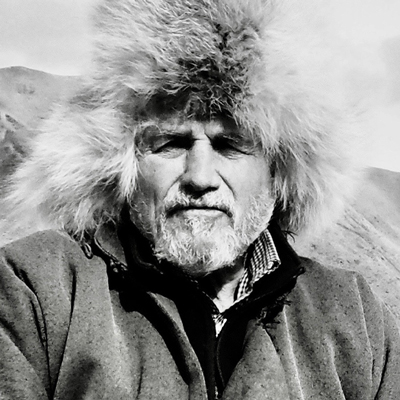
Anthony Willoughby’s unorthodox upbringing in Africa led him to venture down the paths less traveled. At the age of 22 he left the UK with a one-way ticket on the Trans-Siberian Express for Japan in search of adventure, opportunities, and inspiration. Five decades later he is still living that adventure. Since 1982, when he went on his first journey to stay with the Chimbu Tribe in the Highlands of Papua New Guinea, Anthony has devoted his life to developing ways to bring their indigenous wisdom, humility, and values to individuals and organizations around the world. He can be reached at [email protected].
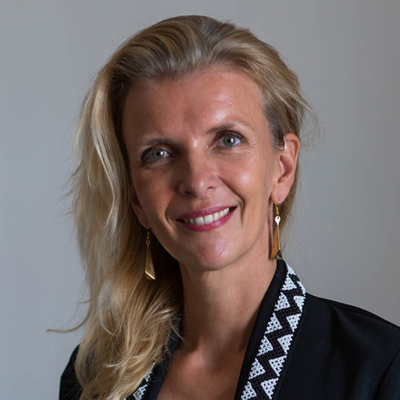
Doutzen Groothof is the founder of StandTall, a boutique coaching and consulting enterprise. She traversed continents in 2015 when she traded her comfortable life in a village in the Netherlands for a one-way ticket into the unknown. On this journey, she ran into Anthony in Tokyo, and the two have collaborated intensively in the years since, developing inspirational journeys together. Doutzen’s consulting practice combines her background in sociology, coaching, and NLP with her two decades of experience working with teams and individuals in both corporate and personal settings. She can be reached at [email protected].
Interviewer: Jordan Rich is celebrating a quarter century at one of America’s top legacy radio stations, interviewing thousands of celebrities, authors, actors, and interesting personalities throughout his career. Jordan is co-owner of Chart Productions Inc. and teaches voice-over acting. His main focus these days is in podcast creation and production, featuring conversations with the world’s most creative people.

View this edition in our enhanced digital edition format with supporting visual insight and information.



